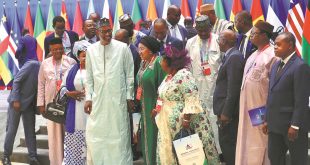Published: June12,2022

African nations can leverage existing collaboration with China to transform their agricultural systems, tackle hunger, malnutrition, and boost rural incomes, a senior International Fund for Agriculture Development (IFAD) official has said.
Guoqi Wu, the associate vice-president of the Corporate Services Department at IFAD, said that Sino-Africa cooperation in the agriculture sector could inject vitality into the continent’s quest to attain food security and tackle rural poverty.
During a virtual interview with Xinhua in Nairobi, the Kenyan capital, Tuesday, Wu acknowledged that China has for decades played a major role to help revolutionize Africa’s farming systems and feeding a rapidly growing population.
Wu said that China, which became a member of IFAD in the 1980s, has provided the resources and expertise required to transform food production systems in a continent grappling with climate-induced food and nutrition insecurity.
According to Wu, China is currently the biggest donor of IFAD among developing countries members, adding that Beijing has also partnered with the UN specialized agency to facilitate South-South and triangular cooperation that has benefited the agriculture sector in Africa.
In 2018, China contributed 10 million U.S. dollars to facilitate the setting up of a facility whose mission is to support knowledge sharing, transfer of technology, and good practices that can transform agriculture in developing countries including Africa, said Wu.
Courtesy of its partnership with China, IFAD’s funding portfolio has been boosted, which has supported the implementation of agriculture and rural transformation projects in Africa, said Wu.
Wu said that best practices on lending from IFAD to China have been replicated in Africa, citing the UN specialized agency’s financing of a biogas project in rural China whose success informed its introduction in several African countries, to promote ecological protection.
Poverty reduction coupled with the agricultural and rural transformation that has been at the heart of China-Africa cooperation for decades, has evolved to cover food donations by Beijing to nations grappling with hunger crises, said Wu.
He noted that China is currently a major importer of horticultural produce including flowers and avocados from African countries including Kenya amid benefits to rural farmers.
Wu said that African nations can borrow lessons from China, which has managed to eradicate extreme poverty and hunger, thanks to the adoption of forward-looking policies and new technologies.
“I think the very first takeaway or best practices that China can share with African countries is the confidence that a world free of poverty and hunger is not a utopia, it is something which is attainable,” said Wu.
He said that China has only 10 percent of the world’s arable land and less than 7 percent of the global freshwater resources, yet it has managed to feed its population, thanks to four decades of robust efforts to transform agriculture.
Wu said that state interventions in the areas of funding and policy, partnership with multilateral agencies, research and capacity building, and adoption of improved seeds are the key to transforming Africa’s farming systems and attaining food sufficiency.
Wu also stressed the need for the continent to invest in climate-resilient farming practices, empower women and youth, and engage the private sector and civil society in a bid to improve farming practices. He believed that access to finance and markets, policy and regulatory reforms, investments in irrigation technologies, roads and power supply are the key to boosting agricultural productivity in Africa.
Xinhua
 Africa -China Review Africa -China Cooperation and Transformation
Africa -China Review Africa -China Cooperation and Transformation
